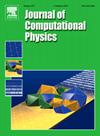A new boundary condition for the nonlinear Poisson-Boltzmann equation in electrostatic analysis of proteins
IF 3.8
2区 物理与天体物理
Q2 COMPUTER SCIENCE, INTERDISCIPLINARY APPLICATIONS
引用次数: 0
Abstract
As a well-established implicit solvent model, the Poisson-Boltzmann equation (PBE) models the electrostatic interactions between a solute biomolecule and its surrounding solvent environment over an unbounded domain. One numerical challenge in solving the nonlinear PBE lies in the boundary treatment. Physically, the boundary condition of this solute solvent system is defined at infinity where the electrostatic potential decays to zero. Computationally, a finite domain has to be employed in grid-based numerical algorithms. However, the Dirichlet boundary conditions commonly used in protein simulations are known to produce unphysical solutions in some cases. This motivates the development of a few asymptotic conditions in the PBE literature, which are global boundary conditions and have to resort to iterative algorithms for calculating volume integrals from the previous step. To overcome these limitations, a modified Robin condition is proposed in this work as a local boundary condition for the nonlinear PBE, which can be implemented in any finite difference or finite element method. The derivation is based on the facts that away from the biomolecule, the asymptotic decaying pattern of the nonlinear PBE is essentially the same as that of the linearized PBE, and the monopole term will dominate other terms in the multipole expansion. Asymptotic analysis has been carried out to validate the application range and robustness of the proposed Robin condition. Moreover, a second order boundary implementation by means of a matched interface and boundary (MIB) scheme has been constructed for three-dimensional biomolecular simulations. Extensive numerical experiments have been conducted to examine the robustness, accuracy, and efficiency of the new boundary treatment for calculating electrostatic free energies of Kirkwood spheres and various protein systems.
求助全文
约1分钟内获得全文
求助全文
来源期刊

Journal of Computational Physics
物理-计算机:跨学科应用
CiteScore
7.60
自引率
14.60%
发文量
763
审稿时长
5.8 months
期刊介绍:
Journal of Computational Physics thoroughly treats the computational aspects of physical problems, presenting techniques for the numerical solution of mathematical equations arising in all areas of physics. The journal seeks to emphasize methods that cross disciplinary boundaries.
The Journal of Computational Physics also publishes short notes of 4 pages or less (including figures, tables, and references but excluding title pages). Letters to the Editor commenting on articles already published in this Journal will also be considered. Neither notes nor letters should have an abstract.
 求助内容:
求助内容: 应助结果提醒方式:
应助结果提醒方式:


